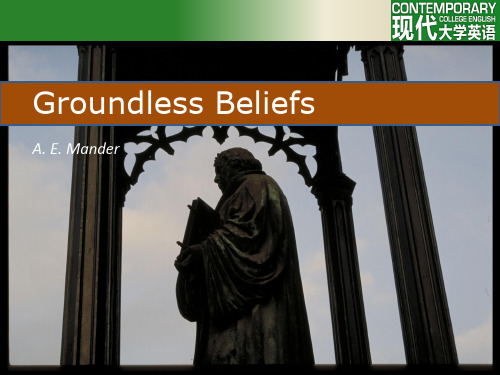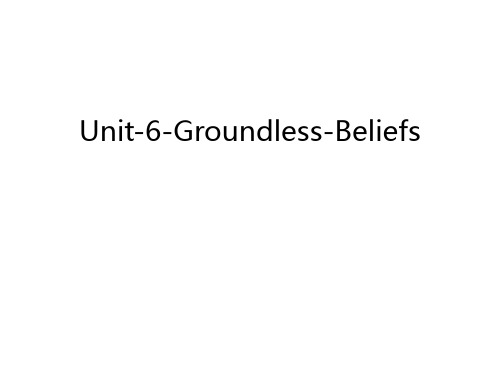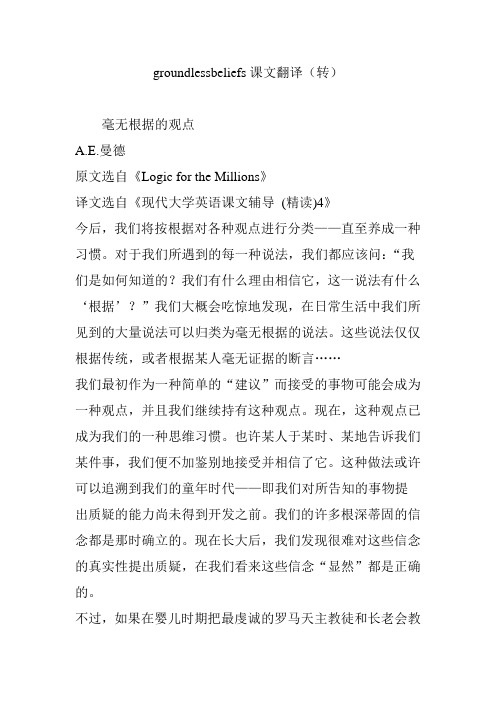现代大学英语精读4第二版Unit3Groundless_Beliefs
精读4配套课件unit3

groundless beliefs in life • Appreciate the logic structure
WB TR
Groundless Beliefs
Unit 3
Author
Background
种 很 伤 感 的 心声在 心
Groundless Beliefs
A. E. Mander
Groundless Beliefs
Unit 3
W arming up B ackground T ext Analysis R einforcement
Groundless Beliefs
Unit 3
Questions / Activities Check-on Preview Objectives
– We know, without a shadow of a doubt, when human life begins。
Text Analysis Detailed Analysis
Part II: Types/Causes of groundless beliefs (paras. 2–24) Section 1. Result of environment in early life. (paras. 2–3)
WB TR
Background
Author
His Life and Works
• A. E. Mander (1894–1985) ✓ A well-published Australian scholar.
• Books
✓ Logic for the millions ✓ Clearer thinking (logic for everyman) ✓ The making of the Australians ✓ Our sham democracy ✓ Psychology for everyman (and woman) ✓ Clearer thinking; logic for everyday use ✓ Public enemy, the press ✓ Alarming Australia
Unit-6-Groundless-Beliefs上课讲义

Listen to the recording and answer
What is the theme of the passage? What do you think is the style of this passage? Find out the main factors influencing the forming of a belief.
He is, as it were, a walking dictionary. They waited, as it were, breathless for the result.
fit in with
If sth. fits in with other things, it is similar to them or goes well with them. 适合,符合,与……一致
加尔文宗[归正宗]
பைடு நூலகம்
Methodists 循道宗
Congregationalists 公理宗
sentiment
A cast of mind; general mental disposition n. 情操, 情感, 情绪, 观点, 多愁善感, 感情
as such
as the word is usually understood; in the exact sense of the word. 从字面意义看,严格来说 The new job is not a promotion as such, but it has good prospects.
improvident
Not providing for the future; thriftless. Rash; incautious.
最新现代大学英语精读4第二版Unit3Groundless_Beliefs讲解学习

Groundless Beliefs
Unit 3
W arming up B ackground T ext Analysis R einforcement
Groundless Beliefs
Unit 3
Questions / Activities Check-on Preview Objectives
WB TR
Background
Author
His Life and Works
• A. E. Mander (1894–1985) ✓ A well-published Australian scholar.
• Books
✓ Logic for the millions ✓ Clearer thinking (logic for everyman) ✓ The making of the Australians ✓ Our sham democracy ✓ Psychology for everyman (and woman) ✓ Clearer thinking; logic for everyday use ✓ Public enemy, the press ✓ Alarming Australia
beliefs • Encourage students to actively identify
groundless beliefs in life • Appreciate the logic structure
WB TR
Groundless Beliefs
Unit 3
Author
Background
Detailed Analysis
(完整版)groundlessbeliefs课文翻译(转)

groundlessbeliefs课文翻译(转)毫无根据的观点A.E.曼德原文选自《Logic for the Millions》译文选自《现代大学英语课文辅导(精读)4》今后,我们将按根据对各种观点进行分类——直至养成一种习惯。
对于我们所遇到的每一种说法,我们都应该问:“我们是如何知道的?我们有什么理由相信它,这一说法有什么‘根据’?”我们大概会吃惊地发现,在日常生活中我们所见到的大量说法可以归类为毫无根据的说法。
这些说法仅仅根据传统,或者根据某人毫无证据的断言……我们最初作为一种简单的“建议”而接受的事物可能会成为一种观点,并且我们继续持有这种观点。
现在,这种观点已成为我们的一种思维习惯。
也许某人于某时、某地告诉我们某件事,我们便不加鉴别地接受并相信了它。
这种做法或许可以追溯到我们的童年时代——即我们对所告知的事物提出质疑的能力尚未得到开发之前。
我们的许多根深蒂固的信念都是那时确立的。
现在长大后,我们发现很难对这些信念的真实性提出质疑,在我们看来这些信念“显然”都是正确的。
不过,如果在婴儿时期把最虔诚的罗马天主教徒和长老会教义信徒予以交换,然后使他们在相反的家庭与影响下长大,所能得出的结果是毋庸置疑的。
我们可以根据所掌握的心理学知识得出结论,两人长大后会持有与现在恰好相反的观点……然后,每个人就像他现在一样,感到自己的观点正确无疑——其实是对方的观点。
当然,在宗教信仰以外的其他许多观点中情况也是如此。
如果我们生长在一个把多配偶制、割去敌方头颅作为战利品、杀害婴儿、格斗或者决斗当成是平常而又自然的事情的社会中——那么我们长大后就会认为这些做法“显然”是自然的、完全合乎道德规范的,也是很正常的。
如果一个英国婴儿被一个德国家庭收养并抚育成人,长大后完全不知道他的父母是英国人,他的全部思想感情与观点就会是“德国式”的而不是“英国式”的。
我们的许多观点——我们许多最根深蒂固的基本信念——是由我们成长的社会文化传统所决定的。
现代大学英语精读4lesson3 原文翻译

UNIT2历史学家们为什么意见不一大多数学生通常是通过一本厚厚的课本接触历史的,他们很快就被淹没在姓名、日期、时间和数据中。
然后学生的技能通过考试来检验,考试考的是他们记住了多少材料。
记得越多,分数就越高。
我们可以从中得出几条明显的结论:学习历史就是学习“史实”;作为历史专业的学生,知道的“史实”越多,你学得就越好。
专业的历史学家只不过是把大量的“事实”搜集在一起的人。
因此,当学生们发现历史学家们即使在研究同一事件时意见也有很大分歧的时候,他们常常感到困惑不解。
对于这种情况,学生们根据自己的常识作出的反应是,断定一位历史学家是正确的,而另一位是错误的。
而且,据此推测,错误的历史学家给出的“事实”是错误的。
然而,实际情况很少如此。
历史学家的论证通常很有道理,并且有说服力。
而且,“事实”——姓名、日期、事件和数据——常常是被证明是正确的。
此外,学生们还经常发现争论不休的历史学家对事实大致持相同意见;也就是说,他们使用大体相同的材料。
他们作出的结论不同,是因为他们看待过去的角度不同。
历史,本来已定就是记忆“史实”,现在变成了从众多解释中挑选一个令人满意的解释的事情。
历史的真相成为了个人偏好问题。
这种看法很难使人满意。
学生们肯定会想,对同一事件的两种完全不同的观点不可能同时是正确的;然而,他们没有能力在两者之间作出选择。
要了解历史学家们为什么意见不一致,学生们必须考虑一个他们或多或少认为是理所当然的问题。
他们必须问问自己,历史到底是什么。
从最广泛的意义上来说,历史指的是人类过去的总和。
比较狭义的概念是,历史是有记录的过去,即留下了某种记录的人类生活的一部分,比如民间故事、手工艺品或者有文字记载的文献。
最后,历史可以被定义为历史学家们书写的过去。
当然,这三种定义互相联系。
历史学家们的记述以过去人们的遗留物为根据;显然,他们不可能对所有的事情都了解,原因很简单,并不是每一件大小事件都被完整地记录下来了。
因此,历史学家充其量也只能接近历史。
现代大学英语精读4--unit6-groundless-beliefs--课件

e.g. He has six previous convictions for theft. They are strong because they have been in our mind for such a long time. They are strong because they were imprinted on our mind when we were little children, before we were able to judge for ourselves. They are strong because they were passed on to us during our most formative years and often by people we trusted and loved.
your behavior.
• She knew beyond a shadow of doubt that he was lying.
• It may be a belief which…ever since:
• 情况很可能是这样的:我们最初仅仅因为 别人的建议而接受了一个观点,而在那以 后就一直持有(坚持)这种观点。
They rest upon mere tradition, or on sb.’s bare assertion unsupported by even a shadow of proof…
to be based on 基于
最新现代大学英语精读4第二版Unit3Groundless_Beliefs讲解学习

Background
Author
Quotations from Mander’s book
• The trouble with most folks is not so much their ignorance, as their "knowing" so many things which ain't so.
---- Josh Billings
• He who cannot reason is a fool; he who will not is a bigot; he who dare not is a slave.
-----W. Drummond
Groundless Beliefs
Theme
Structure
➢What are the words used by the author in referring to groundless “beliefs”? --- propositions, assumptions, dogma, opinion ➢According to the author where do these beliefs come from? --- from other people: family, friends, media, tradition, interest groups, etc. ➢Why do we tend to accept these beliefs? --- “suggestion”, self-interest, sentimental associations, Fashion ➢Why do we have to be on guard against them? --- most of them are irrational; they are _________ rather than thought. --- once they become so s________ in they prevent us from accepting new ideas.
现代大学英语精读4lesson3课后答案

1.Translate1)into Chinese(1)专业的历史工作者(2)基于常识的反应(3)事物的这种状况(4)意见不一的历史学家(5)已经准备好了的现成的东西(6)一个个人喜好不同的问题(7)截然不同的观点(8)民间故事(9)书面文件(10)过去的遗留物(11)人的动机和行为(12)复杂和精细(13)商船(14)一旦发生潜艇战(15)一个粗糙的理论(16)好战的行为;战争行为(17)宣传机器(18)德国外交部长(19)实力平衡(20)(事物的)因果(21)海岸炮兵(22)终极关怀(23)(事物的)近因(24)人们常说的一句话(25)不会出错的解释(26)绝对有效的模式(27)永不停止的探索(28)一个难以达到但又十分诱人的目标2) into English(1)to gain new insights(2)to revise one’s ideas(3)to trace the cause(4)to begin from this premise(5)to open fire on/at(6)to give equal weight to sth(7)to support a certain view(8)to influence the government(9)to destroy the balance of power(10)to form an alliance(11)to repay the loans(12)to contemplate war(13)to fill in the gaps(14)to conclude the quest(15)to view sth from a certain perspective(16)to benefit from the comparison(17)to eliminate from the comparison(18)to dig into the problem(19)to be immersed in a vast sea(20)to stem from a different point of view(21)to be destined to do sth(22)to ignore the fact(23)to make an assumption(24)to defeat the enemy(25)to win back one ’s lost territory(26)to sink a boat(27)to intercept the secret message(28)to piece together evidence(29)to approximate the truth(30)to master new techniques2.Give synonyms and antonyms of the following.1)synonyms(1)elusive : puzzling, baffling(2)intriguing: fascinating(3)evident: clear, plain, obvious, noticeable(4)ultimate: final, last(5)to revise: to correct, to change, to alter, to modify, to rewrite(6)to probe: to dig into, to investigate, to look into(7)belligerent: warlike, warring, aggressive, hostile(8)in addition to: besides, apart from, plus(9)in the event of: in the case of, should sth occur(10)nonetheless: nevertheless, in spite of that, just the same(11)to conclude ( the quest) : to end (the search / probing)(12)to denote: to refer to(13)persuasively: convincingly(14)more or less: on the whole, generally speaking(15)moreover: in addition, besides, apart from that, what ’s more(16)by way of: through2)antonyms(1)to be faulted: to be praised(2)exhilarating: depressing(3)unquestioned: doubtful(4)validity: unsoundness, weakness(5)premise: conclusion(6)motivation: effect(7)proportionate: disproportionate(8)pro-British: anti-British(9)to take into account: to ignore(10)crude (theory): a well-developed (theory), a sophisticated (theory)(11)confused: clear, clear-minded(12)professional: non-professional, amateurish3.Replace the words in bold type with words and phrases you know that convey more or less thesame meaning.1)simple/primitive; told; thick2)pondering/thinking about; future/fate; insignificant3)completely/entirely; different/opposite4)consider/regard; look at; angles/points of view5)knows very well; growing/increasing; complaints6)besides/apart from; easy; in the case of/if there is7)purposely paid no attention to8)generally/on the whole; however/but; come from/originate from9)absolutely reliable; wipe out/get rid of; bound to4.Translate1)The cause of the aircraft crash is so far unknown.2)The cause of global warming is still hotly debated among scientists.3)He devoted all his life to the cause of environmental protection.4)The river has caused us a lot of trouble in history.5)What do you think caused the upsurge in international terrorism?6)We must try and unite with those who have opposed us.7)There is always opposition to any progress and reform.8)Some people are always opposed to new things.9) A lot of those loans were never repaid. That high ratio of bad debts finally led to thefinancial crisis in this second economic power in the world.10)The Business Bank now offers a special loan to students who can’t pay for theireducation.11)The boy asked Mrs. Stow for the loan of her binoculars.12)She concluded her speech by saying that she hoped she could come again some dayand see more of the country.13)As soon as they concluded the investigation, they were to report to the Security Council.14)During his visit, he will conclude a new trade agreement with India.15)Based on those reasonable doubts, the jury had to conclude that the boy was not guilty.16)She is flying to New York by way of Tokyo.17)I ’dlike to say a few words about the situation in the sixties of the last century by way ofan introduction to the movie.18)They decided to recall their ambassador by way of protest.5.Put the most appropriate words in the blanks.1)while/although; to2)over/about; with3)to; in4)led to/resulted in/caused5)with; lends/gives/brings6)from; in7)as to; of8)in the even of; survive9)to; to; study10)out; in11)in; weight/priority12)denote; of13)immersed/buried; more or less14)rather; the more15)at; stems from/comes from/originates from/results from16)base; filled in。
- 1、下载文档前请自行甄别文档内容的完整性,平台不提供额外的编辑、内容补充、找答案等附加服务。
- 2、"仅部分预览"的文档,不可在线预览部分如存在完整性等问题,可反馈申请退款(可完整预览的文档不适用该条件!)。
- 3、如文档侵犯您的权益,请联系客服反馈,我们会尽快为您处理(人工客服工作时间:9:00-18:30)。
a shadow of
Text Analysis Detailed Analysis
Part I: Exercise
• Translate the following sentences into English, using words in the brackets.
– 如今,在他们生活的城市,农民工很少被当成市民看待。(class) – Yet few of migrant workers are even classed as citizens of the city where they
Aristotle vs. Galileo’s
• Why was Galileo able to prove Aristotle wrong? • What lesson shall we learn from Galileo’s experiment?
Warming up Check-on Preview
be based on
the slightest trace of proof
These groundless believes are either based on tradition or on somebody’s strong claims which are not supported by the slightest trace of proof.
Main Idea
➢ What does the author advocate in the first sentence? ➢ Have you ever asked yourself these questions? ➢ Can you give examples of groundless beliefs which rest
live. – 一个国家的实力不只是取决于经济发展;它至少在相同的程度上有赖于其
教育水平。(rest upon) – The strength of a country does not rest upon economic development alone; it
rests upon education, at least to the same extent. – 我们明确地知道,人的生命从何时开始。(a shadow of…) – We know, without a shadow of a doubt, when human life begins。
Background
Author
Quotations from Mander’s book
• The trouble with most folks is not so much their ignorance, as their "knowing" so many things which ain't so.
inquiring mind Discuss how to develop such a mind
WB TR
Text Analysis Structure
I. The Introduction (para. 1): Prevalence of groundless beliefs
II. The body (paras. 2–24): Types/Causes of groundless beliefs
1. Result of environment in early life. (paras. 2–3) 2. Parroting. (paras. 4–13) 3. Self-interest (paras. 14–17) 4. Sentimental associations (paras. 18–19) 5. Fashion (paras. 20–24) III. The conclusion (para. 25): The writer’s praise of
Detailed Analysis
Unit 3
Text Analysis
WB TR
Text Analysis Theme
Understand the sources of groundless beliefs
Develop the alert to groundless beliefs Emphasize the importance of a curious,
Text Analysis Detailed Analysis
Roman Catholic ✓In order to be saved, all persons who have attained the use of reason must believe explicitly that God exists and that he rewards the good and punishes the wicked. ✓The Church is the congregation of all baptized persons, under the authority of the Sovereign Pontiff and the bishops in communion with him. ✓We find the chief truths taught by Jesus Christ through the Catholic Church in the Apostles' Creed.
Warming up Objectives
• Call attention to groundless beliefs • Understand the causes of groundless beliefs • Discuss the importance of inquisition • Consider the strategies against groundless
Text Analysis Detailed Analysis
Part II: Types/Causes of groundless beliefs (paras. 2–24) Section 1. Result of environment in early life. (paras. 2–3)
beliefs • Encourage students to actively identify
groundless beliefs in life • Appreciate the logic structure
WB TR
Groundless Beliefs
Unit 3
Author
Background
Groundless Beliefs
A. E. Mander
Groundless Beliefs
Unit 3
W arming up B ackground T ext Analysis R einforcement
Groundless Beliefs
Unit 3
Questions / Objectives
Text Analysis Detailed Analysis
Part I: Words & Expressions
Words
Phrases
Sentence Pattern
class
come across meet with
What reason have we for doing…
rest upon(on)
Warming up
WB TR
Warming up Questions / Activities
Are carrots a rabbit’s favorite? How do you know?
WB TR
Questions / Activities Warming up
Lesson 6 – Groundless Beliefs
➢ How can a simple “suggestion” become a “belief”?
✓ …uncritically we accepted and believed it. ✓ …we didn’t have the power of questioning.
➢ How shall we deal with the beliefs developed in early childhood?
➢What are the words used by the author in referring to groundless “beliefs”? --- propositions, assumptions, dogma, opinion ➢According to the author where do these beliefs come from? --- from other people: family, friends, media, tradition, interest groups, etc. ➢Why do we tend to accept these beliefs? --- “suggestion”, self-interest, sentimental associations, Fashion ➢Why do we have to be on guard against them? --- most of them are irrational; they are _________ rather than thought. --- once they become so s________ in they prevent us from accepting new ideas.
rational thinkers
Text Analysis Detailed Analysis
